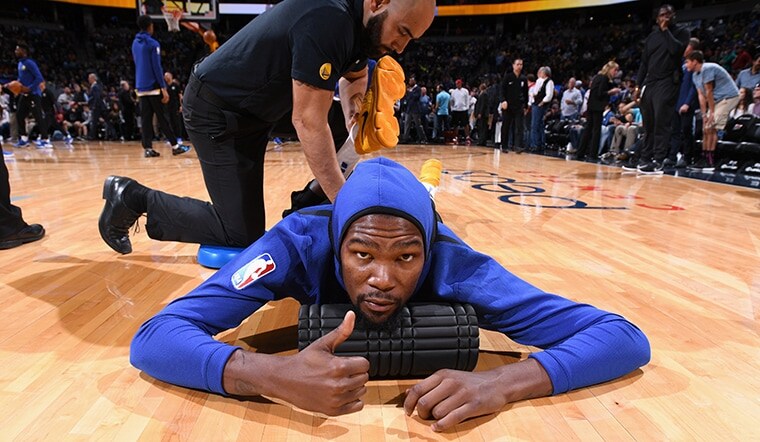NBA players are some of the top athletes in the entire world, and that doesn't happen by accident. Maintaining physical health is a large and vital part of any professional athlete's daily lifestyle, and they have resources at their disposal to ensure they're operating at an optimum level of performance.
While you might not be an NBA player, we're now bringing some of those resources to you.
Throughout the remainder of the 2017-18 NBA season, the Official Team Physicians of the Golden State Warriors, along with Chelsea Lane – the Warriors' Head of Physical Performance & Sports Medicine – and various Physicians at Stanford Medicine will provide input and suggestions on some of the most common health problems facing everyday people today.
In this first installment of Wellness Wednesdays, Lane and Dr. Megan Ruth Mahoney will tackle the subject of New Year's Resolutions, and how to approach and maintain them.
First things first: when it comes to deciding on a resolution to pursue, Lane recommends choosing one that is realistic:
"If you are going to have a New Years Resolution, don't limit yourself, but do be realistic," Lane says. "Break your goals into achievable tasks that build toward the end goal over a realistic time period. It helps keep you on task and helps to reduce feeling overwhelmed by the project."
Dr. Mahoney similarly stresses the importance of being smart when deciding on a goal:
"I have noticed that when people lack intrinsic motivation and do not set a goal that is an achievable and incremental step toward health, they often cannot continue with their resolution for more than a few weeks," says Dr. Mahoney. "Those who have specific, measurable, achievable, relevant and time bound goals – a.k.a SMART goals – are more likely to sustain their commitment throughout the year until their target is met."
A quick glance at the calendar will indicate we're midway through February, so perhaps you've already encountered some adversity in building towards your goal. No matter, says Lane: "Let's not focus on people losing their way; let's talk about ways to help people make good choices more often."
Both Lane and Dr. Mahoney stress the importance of holding yourself accountable to the resolutions you make, and offer a couple suggestions as to how to do so, including tracking and support systems:
"Tracking progress in a personal log is an effective foundation for self-efficacy," says Dr. Mahoney. "Social supports can facilitate attainment of health-related goals. A social support can be a family member, friend, trainer, and even an online health coach."
Lane also sees the benefit in tracking progress: "Keep a diary so you can track your progress and mark off your achievable tasks as you achieve them," she says. "Write down your reasons and motivations for wanting to achieve your goal and keep them handy. On the tough days, it's good to have a reminder of why making good choices is important to you."
Now, you may be sitting there thinking, it's easy for doctors and trainers to give that advice, but it's an entirely different task to follow it. Well, believe it or not, they deal with their own health-related resolutions, too. They – like the Warriors – are human after all, and therefore face many of the same kind of daily challenges as the rest of us.
For Lane, the heavy travel involved in her personal schedule poses a constant challenge to her healthy lifestyle:
"In my role, I am on the road more often than I am at home, but I am also very time-poor even when I am home," shares Lane. "One of my current ‘work-ons' is trying to prioritize getting quality sleep and allowing myself 30 minutes of daily meditation, so that I can be a happier and kinder person when I am lucky enough to spend time with my family. Realistically, I can't be at home more often, so my goal is to make the time I am at home more enjoyable by being a healthier, calmer person."
And, as Dr. Mahoney details, you don't have to be flying cross-country constantly be presented with a challenge to live healthier. Often the opportunities are right there in front of us:
"Last year I committed to not taking the elevator," relates Dr. Mahoney, "and instead climbed the stairs, for the year. It was rewarding to see how I could challenge myself and reap the benefits of my sustained effort."
So, whether it's losing weight, improving sleep or simply electing to do the work rather than have a machine do it for you, there are little things we can do everyday to live a healthier lifestyle. If you're setting a goal, make sure it's both realistic and measurable, and don't get down on yourself if you stumble. Track your progress, and share it with your support system as a mechanism for both positive feedback and accountability. And as Lane reminds us, the decision to be healthier can be made at any time.
"Recognize that a New Year's Resolution is just a framework for making better choices," she says. "You don't have to wait for January 1st to make better choices."
